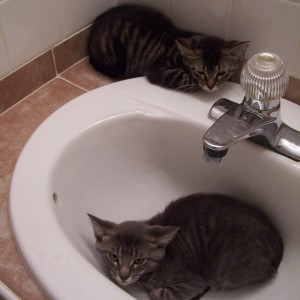 All shelters are overwhelmed with puppies and kittens at certain times of the year, which vary with location and weather–even from year to year. Come spring, people find orphaned kittens in sheds and other places often unused over the winter. Sometimes the kittens are feral. Other times, kittens are simply born in a location selected by an indoor-outdoor house cat seeking a safe and private place to have her family. Occasionally, one of the little feline creatures tests positive for FIV and the rescuers have more questions than answers.
All shelters are overwhelmed with puppies and kittens at certain times of the year, which vary with location and weather–even from year to year. Come spring, people find orphaned kittens in sheds and other places often unused over the winter. Sometimes the kittens are feral. Other times, kittens are simply born in a location selected by an indoor-outdoor house cat seeking a safe and private place to have her family. Occasionally, one of the little feline creatures tests positive for FIV and the rescuers have more questions than answers.
The first, and most important advice, is to keep any new cat quarantined (separated from your other cats) until it is checked by a veterinarian. The FIV test is simple and inexpensive. If you work with feral cats, keep the garage or cats’ room separate from areas used by your household cats and wash your hands every time you handle a quarantined cat. Keep the litter pans, bedding, feeding utensils, and crates separate too. When you are done caring for a feral or a new litter, sanitize everything thoroughly. This applies to puppies too.
Some viruses can live a very long time on surfaces and track into the house. It is advisable to change shoes and clothing scrupulously when you treat any animal with a contagious disease. If parvo is involved, get professional advice because it can live a very long time on surfaces and be transmitted to other animals by guests.
That said; FIV is not easily transmitted. It’s most often spread through bites and birth. Bites that break the skin and transmit the disease are generally of the aggressive type that occur when there’s a dispute between two intact males over territory. Kittens of an FIV mother are not always FIV positive. There’s no need to panic. Some veterinarians are not that familiar with the latest information on FIV because they may not see it often. Be sure to consult with a veterinarian with FIV experience.
First of all, there are really a low number of cats that test positive, even in feral colonies. The positive test rate is only 1 1/2 to 3 percent of the cats, whether domestic or feral, according to Alley Cat Allies, Spring 2001 Newsletter. It is also important to retest and not panic because the first test results are not always accurate. FIV is a virus and the early symptoms are similar to your virus symptoms.
Early symptoms are lethargy, little appetite, and fever. The symptoms may clear up and go away without treatment. On the other hand, virus-like symptoms do not necessarily mean FIV. Cats get other viruses too. When your cat is not feeling well, it is best to have it checked by a veterinarian as soon as possible. Don’t wait to see if the problem will go away.
Animals hide illness and disease for self-preservation. In nature, illness is vulnerability and may invite predators. By the time disease is apparent to the human caregivers, it may be far more serious than we realize. Here are a few of the facts about FIV that I collected from several reputable sources, including Best Friends magazine, Alley Cat Allies website and resource articles, and my personal reference books.
- FIV is spread almost entirely through serious bit wounds.
- FIV is not spread by casual contact, such as through sharing food, water, or litter. Likewise, you won’t spread it by casual physical contact such as cuddling and playing with your cats.
- FIV is only found in cats. It doesn’t spread to other species (human or animal).
- FIV cats may live their entire lives with good health and never have any symptoms.
- The ELISA snap test is the most common test. However, the most accurate test is the Western Blot test.
- FIV cats are most likely to remain healthy if they are kept indoors, fed a high quality diet, and given regular veterinary care whenever there is any sign of illness.
- FIV is a virus that affects the immune system over a long period of time and the effects vary from cat to cat.
- FIV was only discovered in 1986. Prior to that time, no one knew it existed.
Many cities now have feral programs that offer advice and free spay-neuter clinics, often called TNR programs. If you need help to find one in your area, drop me a note and I’ll do my best to help you find local resources.
If you adopt a kitty and later find out that he or she is FIV positive, please don’t abandon the kitty or give him up. The prognosis for your cat is very good and they often live a long and healthy life as cherished companions. If you need more information, feel free to ask for additional resources and information. I’ve been working with feral cats and TNR programs for over ten years.
